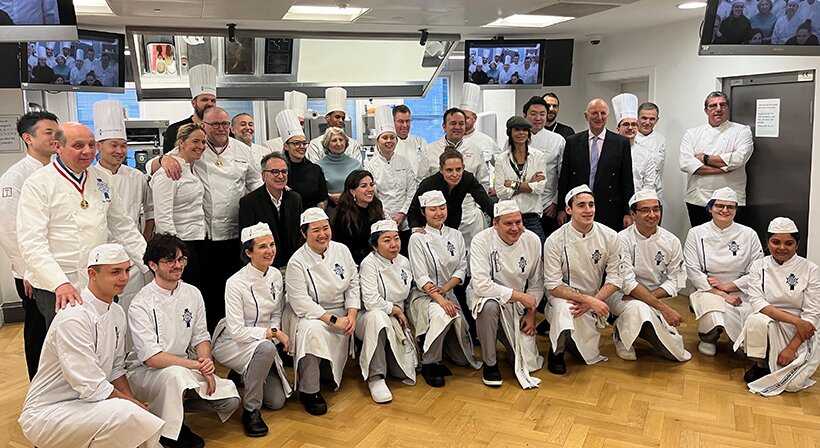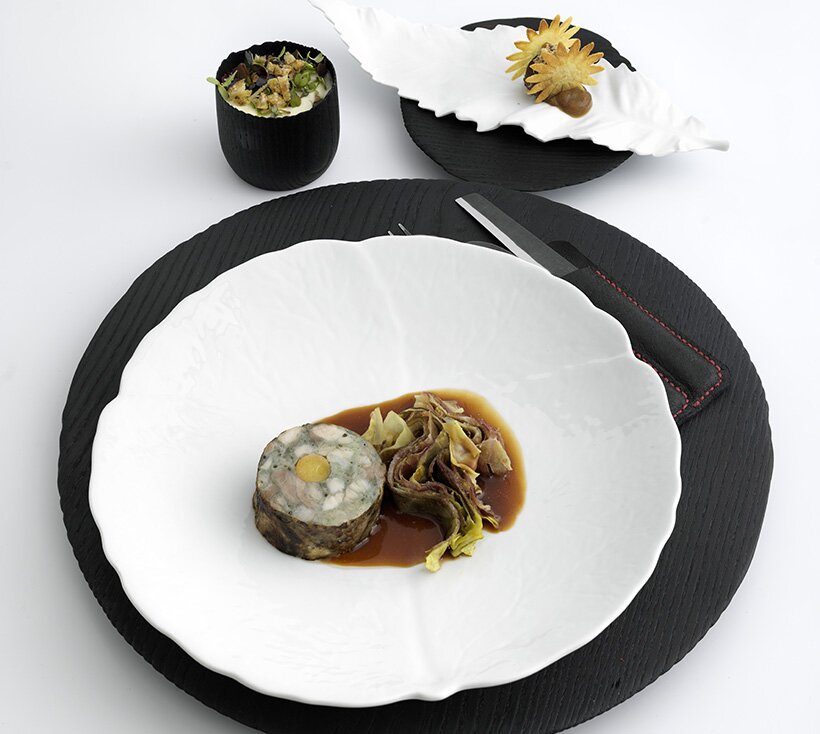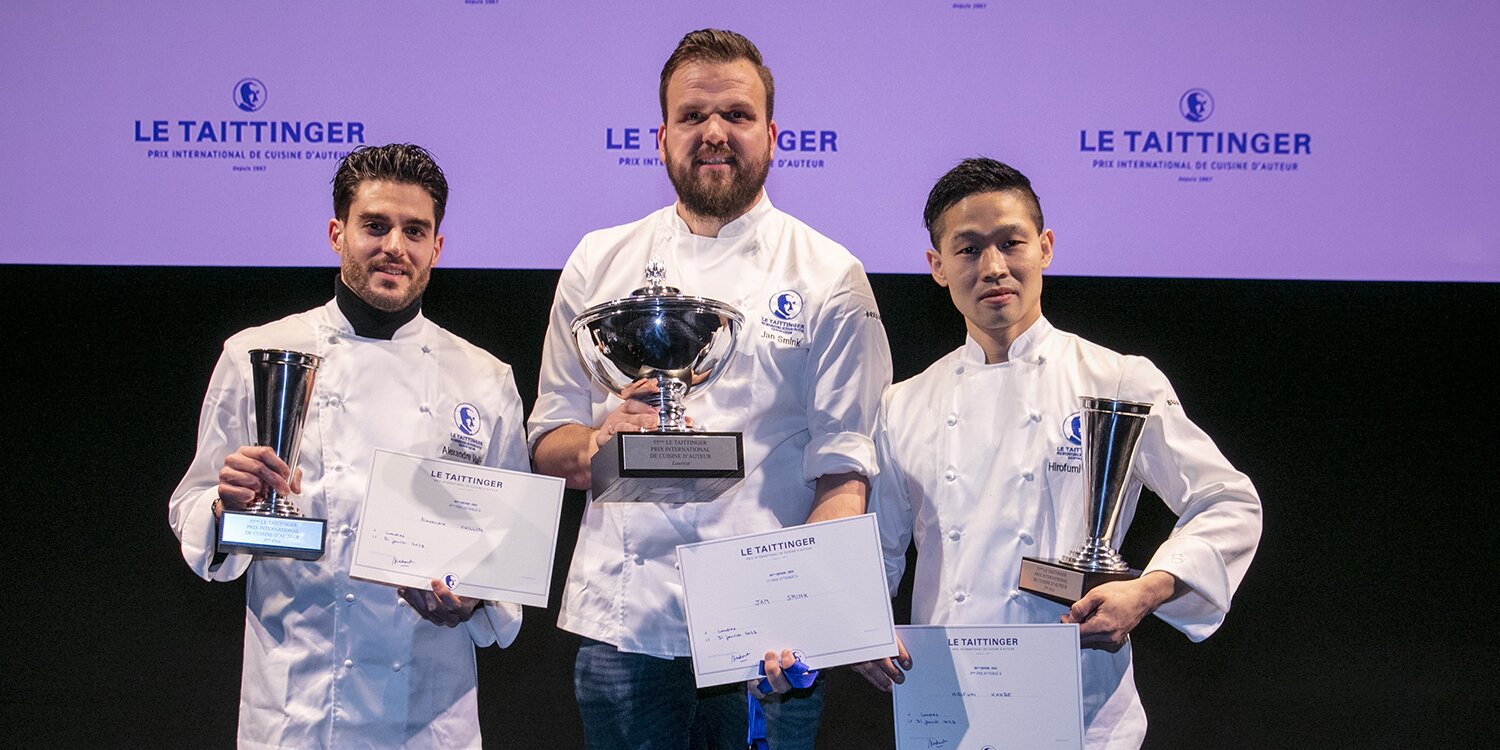When Le Taittinger Prix Culinaire came to London
Le Taittinger Prix Culinaire visited London for the first time, showcasing the innovative cooking and the creations of UK contender Paul Burgalières. Jungmin Seo reports
Since Le Taittinger Prix Culinaire first launched in 1967 under Claude Taittinger, owner of the family-run Champagne house, only two chefs from the UK have won the coveted title, and their victories came over 50 years apart. The first was in 1971 when Michel Nicoleau of the Connaught hotel in London was crowned champion, the second in 2020 when the victor was Charles Coulombeau of Gravetye Manor in West Sussex. France, by contrast, scooped the title 37 times.
But the UK does now hold one Prix Culinaire record, as last week the competition was held outside of Paris for the first time in its 55-year history, at Le Cordon Bleu cookery school in London’s Bloomsbury.
John Williams, executive chef of the Ritz London, former competitor of the Prix Culinaire championship and member of the international jury for this year’s competition, sees this as a welcome development.
Ahead of the tastings, he says that it’s “fantastic that they came to London first”, especially considering that the UK had previously taken a decade-long break from the competition, failing to leave much of a mark on the podium until Michel Roux Jr approached the Prix Culinaire in 2015.
Williams also praised the competition’s emphasis on the rigorous testing of classical techniques. Previous iterations of Le Taittinger Prix Culinaire – as recently as 2017 and 2018 – involved contestants perfecting traditional French dishes, such as red deer wellington with croquette potatoes, and turbot with cucumber beurre blanc. However, since 2020, candidates have been asked to express themselves through their interpretation of a hero ingredient – all while demonstrating the highest standards of culinary artistry.
Jean-Pierre Redont, who organises the culinary prize, explains that as the competition moves forward, it is becoming the “complete opposite” of what it used to be. “We want it to be less formal in a way than before; we want to give freedom and creativity to the candidates.”
This year, contestants from eight countries – the UK, France, Belgium, Japan, Switzerland, Sweden, the Netherlands and the US – were asked to craft a main dish of pork, supplied by Richard Vaughan of Huntsham Court Farm, as well as a mystery dish comprising a vegan soup.
Two weeks before the competition, UK representative Paul Burgalières, head chef of Simon Rogan’s three-Michelin-starred L’Enclume in Cumbria, is practising his main course in a pristine kitchen beneath Restaurant Cord by Cordon Bleu in the City of London. The dish is formed of three central parts: the potatoes are sprinkled with grated chestnut and wrapped in a crispy potato leaf, and the ragout of trotter, neck and shank with a purée of pickled walnut for a “McDonald’s flavour” is coated in celeriac foam and topped with crispy pork skin. This is accompanied by the dry-aged Middle White pork leg, shoulder, belly, and loin, diced together in a pork mousse with fennel, dried kale and an insert of swede. The meat is garnished with layers of braised cabbage, Welsh truffle and coppa, drizzled with sauce made from pork bones, Cartmel verjus and, of course, Champagne Taittinger.
Burgalières, who was born into a family of butchers in Limoges, was inspired by his French and English background for this dish. The cabbage blanched in buttermilk (without the truffles) was a recipe that belonged to his grandmother, who he would cook with as a child during his visits each year. The crockery that was used to plate each component of the dish was also hand-crafted for the purpose of the competition.

After completing both dishes in three hours and 45 minutes, as required, he says: “Every candidate was very nice. It’s awkward for the first couple of hours but when you see them two days before, you start to open their shell and people talk a bit about their experiences. “I’ve put a lot of effort in and people around me have made things for this special event. I’ve been working hard for it and it’s amazing.
I really enjoyed it.” He reveals that he wasn’t particularly flustered by the vegan starter because he was “used to it” from working with a lot of vegetables at L’Enclume.
Contestants were only given an hour after selecting their order from the “mystery box” of seasonal green produce. Burgalières settled on squash broth infused with bergamot, mushroom dumpling, pickled shimeji mushroom and roasted pistachios, which he had to prepare while crafting his pork dish. Having tasted all the soups and mains, Roux Jr, owner of La Gavroche and honorary president of the international final jury for the 2023 Prix Culinaire, says that the vegan twist made all the chefs “get their thinking hats – or thinking tocques – on and really go to town in making a very special soup”. For the second year running, the Prix Culinaire has called upon candidates to devise a plant-based dish. Last year, it was the spring vegetable starter; this year, it was the vegan soup.
Roux adds: “I think part of it was coincidence, but also it is a fact that restaurants are looking at more and more plant-based foods, so it’s very topical. It didn’t throw the chefs because they are now all used to cooking with just vegetables. I think it was a really good challenge. They all rose to the task: we didn’t have two soups that were the same.”

In the coming years, Roux expects the Taittinger Prix Culinaire to bolster its international presence. It was foreshadowed somewhat by the move of the 54th competition in Paris from École Ferrandi to the Cordon Bleu, which has more than 35 institutes in 20 countries.
He says: “It’s a competition that is evolving every year, which is fantastic, and I know for sure it’s going to be in Paris next year, but the Taittinger family want to go further afield, so why not in Belgium, Sweden or maybe Japan?”
Dominique Crenn, owner of Atelier Crenn San Francisco and another member of the international jury, has already succeeded in diversifying the pool of candidates. Not only did she keep her promise from last year of “bringing some women” – contestant Claudette Zepeda of Vaga in San Diego – but she also introduced the first US candidate to participate in the championship.
“Everything was just so beautiful,” she says. “Food is subjective. All the dishes are pretty amazing, and I think it’s going to depend on how we welcome that to our palate. My palate might be different to other people [so] they’re all a winner. I don’t like the fact we have to choose.” But, of course, they did. Jan Smink from Smink in Wolvega in the Netherlands, who finished third in last year’s competition, was crowned champion after three consecutive attempts at the title.














